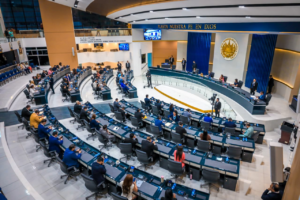The Consejo Superior del Trabajo (CST) has taken a fundamental step for the development of El Salvador, agreeing on an action plan to address economic reactivation and informality. In its first session, this tripartite body, composed of representatives from the government, employers, and workers, unanimously defined the seven points that will guide its work.

During the meeting, crucial topics such as business formalization and export promotion, essential elements for the country’s growth, were highlighted. CST President Rolando Castro emphasized that these agreements are not just a declaration of intent, but rather respond to the urgent need to strengthen the national economy.

Among the most relevant points are the transition from the informal to the formal sector, the modernization of labor legislation, and the development of human talent. These issues, defined as “urgent” by Castro, demonstrate a serious commitment to improving working conditions and market competitiveness.


To ensure the plan’s effectiveness, technical teams have been formed, made up of representatives from the three sectors. These teams will be responsible for fine-tuning the details of the proposals to be presented at the next council meeting, with the goal of delivering concrete agreements to President Nayib Bukele.

This consensual agreement sets a precedent in social and economic dialogue in El Salvador, demonstrating the capacity of the different sectors to work together for the common good. The CST is positioned as a key player in formulating policies that promote stability, employment, and sustained economic growth.








